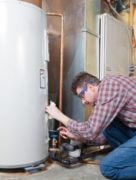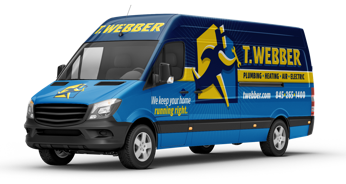
3 Ways Keeping Up with Water Heater Maintenance Could Save You Big
For the most part, water heaters are fairly self-sufficient, and you can rely on your to warm water for showering, washing clothes, washing dishes, etc. However, it’s still a good idea to keep up with some basic maintenance. In fact, properly maintaining your water heater now could save you a lot of money later. Here are just a few of the ways that water heater maintenance could save you money. Benefits of Water Heater Maintenance When you’re not having problems with your water heater, you probably don’t give it a whole lot of thought, and you may be hesitant … [Read More]

3 Signs That It’s Time to Replace Your Water Heater
Few things are more unpleasant than stepping into a freezing cold stream of water when you’ve been looking forward to a nice, hot shower. Unfortunately, even the best water heater won’t last forever, and older systems are prone to breakdowns and complete system failure. There is good news, though. By watching out for a few warning signs, you can avoid total system failure. Here are a few signs that it may be time to replace your water heater. Signs That It’s Time to Replace Your Water Heater Rusty Water Do you have reddish water coming from your hot water … [Read More]
Why You Should Make the Switch to Tankless Water Heating in Brewster, NY
Perhaps you’ve taken a look at your conventional water heater recently and thought, “Wow, this needs to go. Like, yesterday.” If you have, you’re not alone. While conventional water heating can provide ample amounts of hot water for your home, its tank can bring all sorts of trouble including rusting, leaks, or even an inability to produce hot water at all. You may even experience more headaches than hot water. Not to mention, the tank won’t be too nice on your utility bills. If you’re looking for a way to experience hot water without all of that tank trouble, … [Read More]
3 Reasons You Need to Replace Your Hot Water Heater in Cold Spring, NY Right Now
You need a hot water heater in Cold Spring, NY at all times of the year for showering, dishwashing, cooking, laundry, and more. However, in recent months, hot water probably hasn’t been what you seek. The hot summertime weather outdoors is instead making you crave ice cold water, either from the tap or your swimming pool. But the summer is entering its final month and fall will be here before you even realize it, meaning you’ll be relying on more hot water to protect yourself against the cooler temperatures. Is your hot water heater ready for the seasons to … [Read More]
Ask Our Plumber in Garrison, NY: When Should You Call for Water Heater Replacement?
At T.Webber, we have a plumber in Garrison, NY who can help you with any plumbing concern you may need this spring. We can provide you with all sorts of plumbing services ranging from pipe leak detection to backflow prevention. Since we’re no longer having to deal with snow and sleet for the next few months, we want to see our customers enjoy the warmer weather as much as possible and a part of ensuring that is having a plumber in Garrison, NY take care of any plumbing problems inside your home. One of the most important plumbing services … [Read More]
What are the Benefits of a Tankless Water Heater in White Plains, NY?
Now that spring is here, you may be looking for a change. For some, this means the opportunity to do some spring cleaning around the house. For others, it’s the chance to start planting flowers in their garden. Or, if you’re the type who values hot water in your home, it may be the time to consider purchasing a tankless water heater in White Plains, NY. T.Webber should be your go-to destination to get a tankless water heater in White Plains, NY. We want to see our customers be able to live comfortably in their homes this spring, and … [Read More]
How Can Hot Water Heater Repair in Brewster, NY Improve Efficiency in Your Home?
The hot water heater is one of the biggest energy consuming devices in the home, accounting for around 14% of the energy you use. Modern units are designed to run efficiently. They can still develop issues that if, left unchecked, will decrease the overall efficiency of your home and drive up utility costs. Think about why you need hot water heater repair in Brewster, NY. Without it, there’s no hot water for showers, laundry, washing dishes, or cooking. Hot water heater repair in Brewster, NY does more than just keep the hot water running. A technician can perform parts replacements … [Read More]
Ask a Plumber in Pleasantville: How Often Do You Need Water Heater Maintenance?
Sure, any plumber in Pleasantville can tell you about the importance of water heater maintenance, but how often do you need it? While you should always try to uphold a high sense of performance and efficiency with your water heater, homeowners often get stuck in trying to find a good way to keep it. It’s either they wait until it’s too late and their water heater is beyond maintenance, or they simply don’t maintain it at all and allow a perfectly good furnace go to waste. Infrequent maintenance can lead to higher water bills, lower energy efficiency, and maybe … [Read More]
Do You Need a New Water Heater in Poughkeepsie?
It can be difficult to keep up with all of the routine maintenance your home requires. However, when it comes to the health of your water heater, its improper functioning can seriously ruin your day. Nobody wants to experience a cold shower, or have to wash the dishes with cold water! Talk about an inconvenience. That’s why you need to have your water heater serviced regularly. Do you know how old your water heater is? If not, chances are it’s outdated. Old, conventional water heaters could be costing you a fortune in energy bills. If you’re ready to upgrade … [Read More]
Water Heater Regulations in Orange County, NY
If you’re a homeowner looking to replace your old water heater in Orange County, then it’s important to be aware of the new federal guidelines governing the energy efficiency of water heaters. These regulations, which go into effect on April 16, 2015, basically require all water heaters to meet minimum energy efficiency standards. The U.S. Department of Energy hopes that this will help reduce the total energy consumption of American households, which is better for the environment. For the consumer, however, one of the most significant benefits will be lower energy bills. New Regulations in Practice So what do … [Read More]




